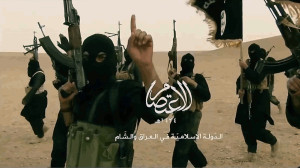
And while the world’s media focused on the events of Charlie Hebdo tragedy, it has simply ignored the terrorist attacks in the Middle East. Moreover, this very attacked has highlighted a major shift in the situation in the region, putting the primary strategic partner of the US in the Arab world – Saudi Arabia at risk. And here’s why.
Early on January 5 four ISIL militants crossed the border of Saudi Arabia in the Northern Province area near the town of Arar border, on the path of the hajj to Mecca from Iraq, Iran and the republics of the North Caucasus and Transcaucasia. Therefore this area is not some deserted spot on the map, in fact it’s a busy intersection of different roads of the kingdom. On the Iraqi side of the border this area is inhabited mainly by Shiites, therefore there’s a number of Saudi units provided with armed aircraft stationed there to defend the border, this very group was reinforced when the Islamic Caliphate was proclaimed at the territory of Iraq.
During a shootout with the Saudi border patrol that broke out when the militants attacked a checkpoint, one of the terrorists was killed while the other detonated an explosive belt, killing three Saudi soldiers including Brig. Audah Al-Balawi, a commander in the Northern Border Region. The remaining two militants were then hunt down and killed. Soldier found automatic weapons, hand grenades, explosive belts and significant amounts of money on the dead bodies.
The attack on the border checkpoint near the town of Arar means that now ISIL has officialy started assaulting Saudi Arabia not only by conducting terrorist attacks in the kingdom, as it had been the case until recently when ISIL militants shot Saudi Shiites dead at the front steps of mosques in the Eastern Province, but by direct military engagements from Iraqi territory, even despite the fact that those areas are theory controlled by the Iraqi government forces. It’s also a puzzling fact a Saudi General was among the dead soldiers, since it’s highly doubtful that one would participate in such an operation. Saudi authorities are clearly hiding something. It is understandable – after all, King Abdullah is at his last legs in hospital, and the question of the possible successor in the most important country of the regionf for the US interests in the Arab world is as pressing as it could be. So why are the world’s media, especially th Western ones, trying to downplay these events? As a matter of fact this attack means that the Islamic Caliphate has virtually breached the border of Saudi Arabia, even it was for a few hours. This is a worrying trend indeed, especially now when the kingdom plays against the global energy market by persistently reducing the price of oil in favor of Washington to deliver a blow to the economies of Russia, Iran and Venezuela. But it doesn’t seem that the local elites are contended with this fact while their revenues crumble.
This attack in its significance is nowhere near random drop mortar shells landing on Saudi territory, in fact it’s a direct hostile move against Saudi Arabia launched by the Islamic State. Riyadh did take all the possible security measures to secure its border with Iraq, that runs for almost five hundred miles. In December 2014 Saudi Arabia created a 12 miles deep no-man’s-land zone and provided the border guards with technical monitoring means to keep it secure. For sure one could praise the successful elimination of the militants but how did they manage to cross the buffer zone and the border in the first place, not afraid to directly assault Saudi soldiers.
In any case, things are looking grim for the Saudi authorities, given the fact that a total of 5 to 7 thousand Saudi citizens are fighting under the Islamic State banner. Moreover they do find a lot of sympathy among the Saudi population, especially among young people. According to some polls, 80% of the Saudi youth of Saudis is sympathetic with the Islamic State. This basically means that at any given moment they are ready to join the ranks of the Caliphate should a massive invasion against the KSA be launched. And it won’t take long especially if King Abdullah passes away and his descendants will be busy fighting for the throne.
It’s no coincidence that a massive group of American “advisers” from the USA, namely the NSA, CIA and the Pentagon agents have been in Saudi Arabia for two weeks now, trying to devise a mechanism that would enable a peaceful transfer of power. Hence, this whole story doesn’t smell good. Should ISIL militants invade Saudi Arabia while there’s no King in Saudi Arabia – the outcome will certainly be disastrous, since the country can fall apart in 3-4 pieces, including the break away of the Shiite districts of Eastern Province to the adjacent Yemen, where the majority of the population is Shiite too.
But the West reminds an ostrich with its head buried deep in the sand, trying to hide a possible ISIL offensive behind a multi-million march in Paris.
Alexander Orlov, political scientist, expert Orientalist, exclusively for the online magazine “New Eastern Outlook”.
